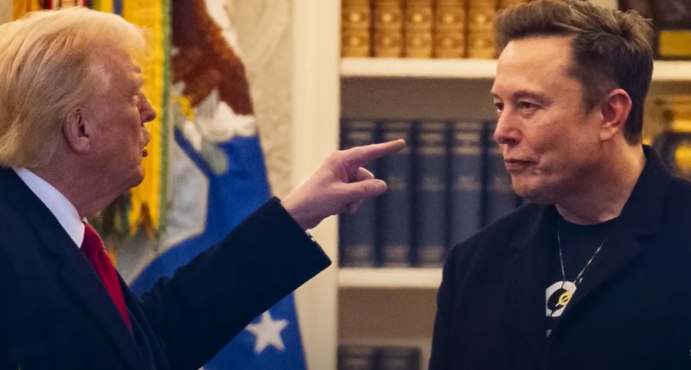EDITORIAL: When Egos Collide - The Explosive Feud Between Elon Musk and Donald Trump Is More Than Just Theater
- Natalie Frank
- Jun 6, 2025
- 4 min read
What the public clash between two of the most powerful men in America really reveals about wealth, power, and the future of political influence
Natalie C. Frank, Ph.D June 7, 2025

In a political climate already characterized by division, the public spat between President Donald Trump and tech billionaire Elon Musk is more than a celebrity grudge match. It’s a power struggle that indicates a deeper transformation occurring in American politics. This transformation is one in which traditional political kingmakers are being challenged by tech titans with unprecedented platforms, resources, and audacity.
The feud erupted when Trump, in his signature bombastic style, attacked Musk at a campaign rally, accusing him of being “another bullshit artist” and claiming Musk once begged him for government subsidies. Musk shot back on X (formerly Twitter), stating Trump should “sail into the sunset” and questioning whether it’s time for a new generation of leadership. From there, the online fireworks only grew worse.
.
But let’s not mistake this for petty drama. This feud shows us a potential future where wealth and influence do not guarantee alignment, and where billionaires may increasingly challenge traditional political power, not reinforce it.
Trump and Musk have long had a complicated relationship. During Trump’s presidency, Musk served on advisory councils, and while he occasionally voiced disagreement with the administration, the two shared some common ground, deregulation, criticism of media narratives, and distaste for establishment elites.
Yet the recent fallout exposes what many suspected all along: their relationship was transactional, not ideological.
Musk’s political stance has never been easily characterized. While he’s criticized what he has referred to as the “woke mind virus” and government overreach, he’s also advocated for green energy, universal basic income, and space exploration funded in part by public contracts. Trump, meanwhile, has built his brand on loyalty, grievance, revenge and control. Musk’s increasing independence, especially his refusal to back Trump in 2024, was bound to provoke retaliation.
What’s changed is not Musk’s positions, but his threat level as perceived by Trump. Owning one of the world’s largest communication platforms has turned Musk from eccentric genius to media gatekeeper. And Trump doesn’t like competing for attention or allegiance, especially with someone who doesn’t need him.
This feud is more than a clash of personalities; it’s a battle for narrative control in a post-institutional era. Trump rose to power by bypassing traditional media and speaking directly to his base through social platforms. Musk has inherited that playbook, owning the platform, controlling the spotlight, and redefining public discourse in real-time.
In Trump’s world, loyalty is currency. When Musk refused to endorse him, he violated an unspoken rule: don’t outshine the President, and certainly don’t question his grip on the MAGA movement.
Musk’s vision of political discourse is chaotic, to say the least, but it is powerful. He offers libertarianism with a side of meme culture, an unusual but compelling alternative to both mainstream progressivism and populist conservatism. His influence extends across demographics that traditional politicians struggle to reach, such as engineers, gamers, crypto enthusiasts, and disaffected centrists alike.
In a world where branding often trumps policy, Musk is challenging Trump not just ideologically but economically and culturally. And Trump knows it.
There’s an uncomfortable truth buried beneath this feud: both Musk and Trump represent different but equally troubling visions of unaccountable power. One rose through real estate and political demagoguery. The other through technological innovation and market dominance. Neither answer to institutions in the traditional sense. And both have massive audiences who trust their words more than they trust elected officials, journalists, or scientists.
This feud isn’t about who’s right. It’s about what happens when the most powerful conversations in the country are dictated by ego rather than accountability and the good of the nation.
Americans should be concerned that major political narratives are shaped not by civic debate, but by billionaires lobbing insults on social media. When policies are decided based on who wins the day’s online war, democracy becomes more about entertainment than governance.
The danger isn’t just in what Musk or Trump say. It’s in the normalization of this interaction, where public figures with unchecked platforms manipulate mass opinion and emotion in real time, with little transparency, accountability or consequence.
As Trump eyes a comeback and Musk positions himself as a cultural force in politics without officially running, their feud could have lasting ripple effects. Musk’s reach on X, combined with his influence in tech, transportation, and AI, makes him a wildcard in any political season. If he throws his weight behind a candidate, or starts quietly shaping narratives against one, it could disrupt even the most calculated political strategies.
For Trump, the feud is a test of control. If Musk can break off part of his base or pull media attention away from Trump, it could mark a shift in who really drives conservative, and centrist energy and momentum in America.
For the rest of us, the message is sobering: The future of political power may no longer lie in Washington, but in Silicon Valley and Mar-a-Lago. And we, the public, are caught in the crossfire of titanic egos fighting not just for influence, but for dominance over determining truth itself.






